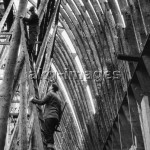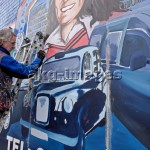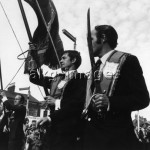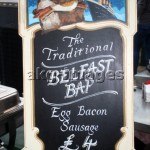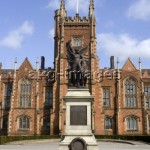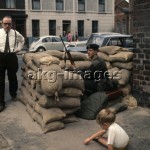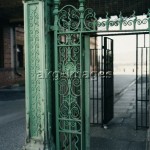The Titanic and an Ulster fry
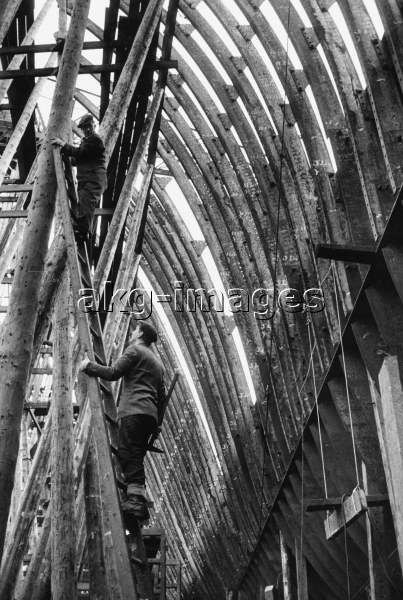
Despite the heat I have been thinking about cooked breakfasts. A close friend of mine is moving at the end of the summer to take up a new post in Belfast, and I have promised to treat him to an Ulster fry the next time I visit. I have family in Belfast and have visited regularly over the past twelve years, so I am interested to see what my (English, nontheist) friend makes of a city which for so long was divided along religious beliefs and national affiliation. A lot has changed in Northern Ireland since the Good Friday Agreement but, as shown by the rioting that has taken place in Belfast in the past few days, Belfast is still a city with fault lines running through it.
Despite having had nothing but positive experiences in Belfast, I have always felt slightly odd when out and about in the city. I think it is because there are so many reminders of the division with which my Belfast friends and family have grown up and which they accept almost as a normal part of Belfast life. Even after a decade of visiting, I still find them jarring. I remember the car journey from Belfast International Airport into the city on my first ever visit. After a fair amount of lush greenery that reminded me a lot of my own place of birth in Wales, I caught my first glimpse of the famous (infamous?) murals that decorate many of the walls and sides of buildings around the city. Somehow they didn’t seem real. They were things I had only ever seen on news reports, usually illustrating some report on sectarian violence. The other abiding memory of that first car ride was the sight of lots and lots and lots of flags. Even during the Olympics and the Queen’s Jubilee I don’t think London was a match for Belfast in numbers of Union Flags on display. I have also seen plenty of Irish tricolours as well, not only hanging from flagpoles but also painted on pavement kerbs to let everyone passing know where that street’s allegiances lie. I don’t think it occurred to me that people would paint the pavements, yet everyone else seemed to think it was a fact of life.
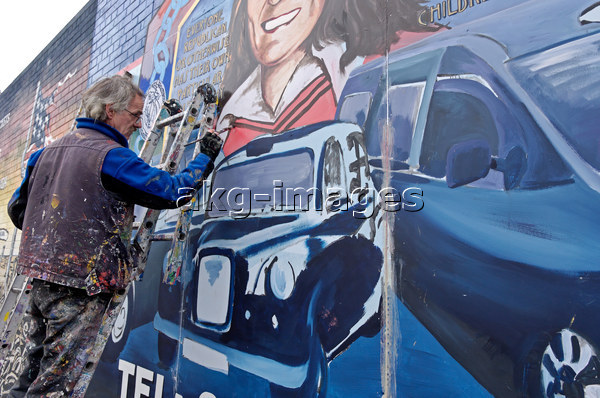
Sands as part of a mural on Divis Street, Belfast. – © Bruno Barbier / akg-images
Having lived through the Troubles, I understand why my Belfast friends are able to deal with their past much more matter-of-factly than I was, but it is still very disquieting when someone points out a building to you and says, “That there’s the Europa Hotel… That’s the most bombed hotel in Europe.” During the unrest in London in 2011, many Londoners stayed in their homes in the evenings to avoid any rioting but most of the Belfast-born Londoners I know seemed completely unfazed by it all and carried on pretty much as normal.
The much-bombed Europa Hotel has been beautifully restored and now offers elegant and high-end accommodation to the many tourists who now come to Belfast to see the murals, along with other famous historical products of the city, including the Titanic (“She was alright when she left here.“). The success of the television version of Game of Thrones is welcome as well, given how much of it is filmed on location in Northern Ireland or in studios in the Titanic Quarter, although I have yet to see Arya Stark or King Joffrey shopping in Victoria Square. Belfast is much more than the Troubles that threatened to define it in the past.
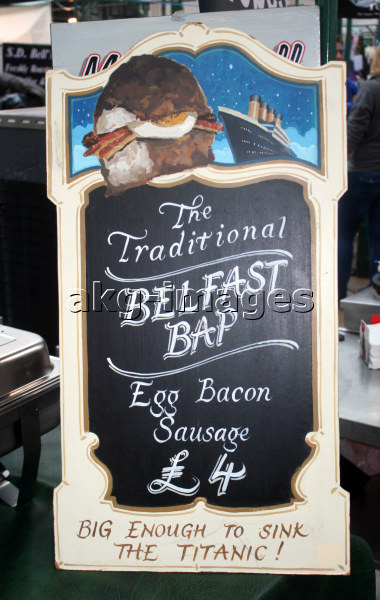
Sandwich board for a “Belfast Bap” in St George’s Market, Belfast, 2012 © akg-images / Jürgen Sorges
I have over the years gotten used to the flags and the murals and the heavily-fortified police stations in Northern Ireland so I will be interested to see how quickly my friend assimilates. Having lived both in the former East and what was West Germany, he already has a good grounding in what happens to a country divided ideologically, although if he spots someone from Game of Thrones before I do, I may rescind that offer of an Ulster fry.

